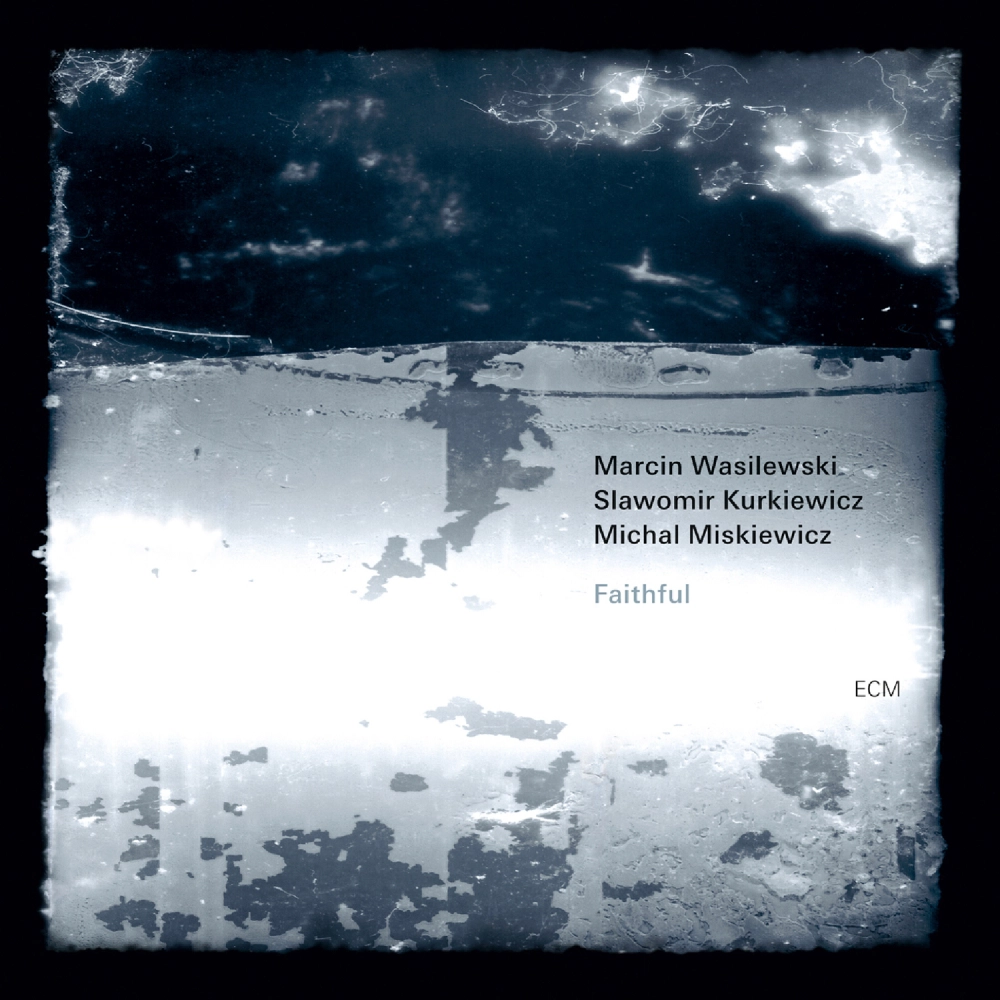Dazzling third ECM album by Poland’s Wasilewski Trio, which perfectly captures the group’s blend of energy and lyricism. There is space here for both the outgoing and the reflective, for profound composition and in-the-moment creativity. The wide-ranging repertoire on “Faithful” (named after the Ornette Coleman title track) includes five new tunes from the pen of Marcin Wasilewski and timeless pieces by Paul Bley and Hermeto Pascoal. From the standard repertory, the trio plays “The Ballad of the Sad Young Men”. Reaching beyond jazz, the players also find a new approach to Hanns Eisler’s “An den kleinen Radioapparat”.
Faithful
Marcin Wasilewski, Slawomir Kurkiewicz, Michal Miskiewicz
- 1An den kleinen Radioapparat
04:30 - 2Night Train To You
10:41 - 3Faithful
07:16 - 4Mosaic
10:34 - 5Ballad Of The Sad Young Men
05:29 - 6Oz Guizos
06:32 - 7Song For Swirek
08:14 - 8Woke Up In The Desert
05:32 - 9Big Foot
06:21 - 10Lugano Lake
06:33
Thomas Conrad, JazzTimes
Continuing directions sketched on 2007’s “January”, and the earlier album called just “Trio” (2004), “Faithful” is the third ECM album by Poland’s Wasilewski Trio. Their ECM discography also includes a further three albums as members of the Tomasz Stanko Quartet: “Soul of Things”, “Suspended Night” and “Lontano”, recorded between 2001 and 2005. Furthermore, pianist Marcin Wasilewski and bassist Slawomir Kurkiewicz are featured on Manu Katché’s “Neighbourhood” and “Playground” albums of 2004 and 2007. Nonetheless, it is to the trio that the listener must turn for the most comprehensive account of the players’ capabilities and inspirations. And “Faithful” may be the most comprehensive album yet from this group, capturing the trio’s admixture of energy, lyricism and ideas.
The album opens strikingly with Hanns Eisler’s “An den kleinen Radioapparat”, a song written (in 1942) from the perspective of a German exile still pursued and haunted by the voices of his persecutors through the medium of the radio. The tune’s had a latter-day revival under the title “The Secret Marriage”, but the Wasilewski Trio reach for a feeling closer to the piece’s original intention.
“Night Train To You” is the first of five new Wasilewski tunes here, described by the composer as “a motoric piece, a process.” At the outset three chords set up a pattern, “like a loop.” Time signatures progress from 6/8 to 11/8. A “very simple melody” takes us to a solo sequence for piano and drums, before the piece slows like a locomotive approaching a station, leading to a final section with improvisations around the chords heard in the open moments.
“Faithful” takes its name from its title track, a tune originally from Ornette Coleman’s 1966 album “The Empty Foxhole”, long a reference at ECM for the clarity of its melodic line and the purity, the innocence, of its improvisation. In an indirect way, it can be related to the history of Wasilewski, Kurkiewicz and Miskiewicz, players who found their shared musical identity when just schoolchildren. Their trio has been in existence since the mid 1990s, and the three musicians have made their discoveries in jazz together.
Marcin’s tune “Mosaic” is patterned like its title, a musical mosaic, with moving and fragmented chords painting a larger picture.
“Ballad of the Sad Young Men”, now a jazz standard was written by Tommy Wolf and Fran Landesmann for the Beat Generation musical “The Nervous Set” in 1959.
Hermeto Pascoal’s “Oz Guizos” (The Bells) was brought to the session by bassist Slawomir Kurkiewicz who counts Brazilian music amongst his inspirations. “Slawomir brought a bunch of Pascoal tunes to rehearsal and we ran them through. This one seemed to speak most clearly to the character of our group.”
“Song for Swirek” is a tribute to the trio’s close friend Marek Swierkowski.
The dreamlike “Woke up in the Desert” was named by Marcin’s friend, Polish rock singer/songwriter Edyta Bartosiewcz. “Every time we have a new recording session I go over to her place and I like to listen to the music with her. I respect her opinion very much and she’s great at finding titles. This title still makes me laugh, but it also works on the imagination. It seems to suggest all kinds of associations.” (Henri Rousseau’s “Sleeping Gypsy” might come to mind, perhaps.) Marcin points out, furthermore, the snakelike movement and sonorities of Michael Miskiewicz’s cymbals and snare.
Paul Bley’s ”Big Foot” (a.k.a. “Figfoot”) was heard one of the very first of ECM’s releases, “Paul Bley With Gary Peacock”, issued in 1970. In the present version its dryly witty twists and turns are more characteristically Bley-like than its romping energy.
Finally there’s “Lugano Lake”, named for the site of the recording, made with producer Manfred Eicher at Lugano’s Auditorium SRI. “It’s a fond memory of a beautiful town, with the lake and the mountain, and sums up for me, the feeling of being there, in a recording.”
You need to load content from reCAPTCHA to submit the form. Please note that doing so will share data with third-party providers.
More InformationYou need to load content from Turnstile to submit the form. Please note that doing so will share data with third-party providers.
More InformationYou are currently viewing a placeholder content from Facebook. To access the actual content, click the button below. Please note that doing so will share data with third-party providers.
More InformationYou are currently viewing a placeholder content from Instagram. To access the actual content, click the button below. Please note that doing so will share data with third-party providers.
More InformationYou are currently viewing a placeholder content from X. To access the actual content, click the button below. Please note that doing so will share data with third-party providers.
More Information














